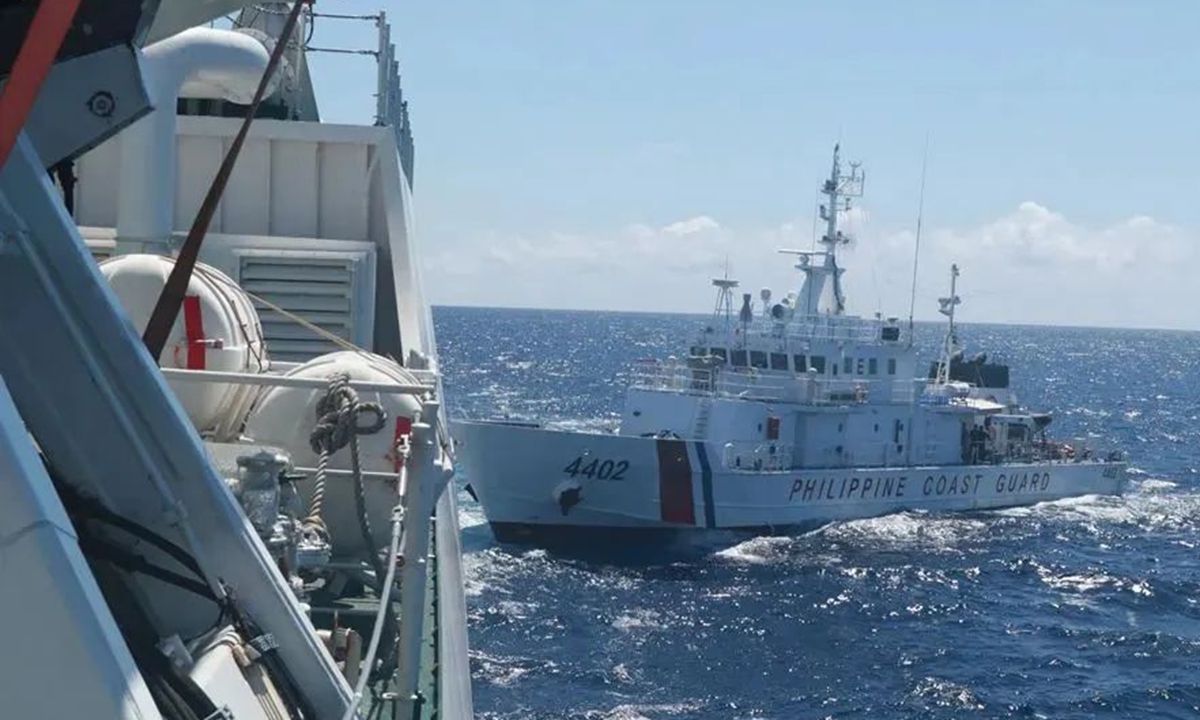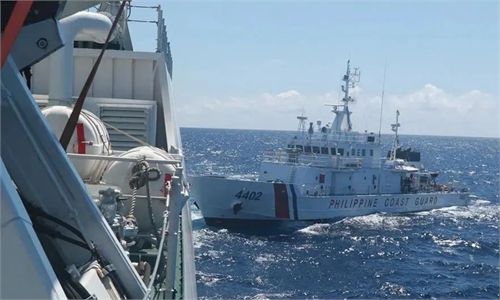Don't take China's restraint at Ren'ai Reef as a chance to exploit: Global Times editorial

China Coast Guard drives away Philippine vessels intruding into waters of China's Nansha Islands
The Philippines, despite China's repeated warnings, insisted on sending vessels carrying illegal construction materials to enter waters near the Ren'ai Reef of China's Nansha Islands on Saturday. The ships then were expelled by the Chinese side in accordance with the law. The hype from the Philippines and the US side is still going on after the incident. On Sunday and Monday, Manila condemned China and then summoned the Chinese ambassador. Meanwhile, Washington immediately claimed that "the US stands with our Philippine allies." It also reiterated the commitment made in the US-Philippines Mutual Defense Treaty, showing a posture to confront China's "armed attack" together with Manila.
In fact, the right and wrong of the matter is very clear. In 1999, a Philippine warship illegally grounded at the Ren'ai Reef, prompting immediate and serious representations from the Chinese side. The Philippines has repeatedly promised to tow the grounded warship away, but 24 years later, not only has the ship not been removed, but there have also been attempts at repairing and reinforcing it which aim for permanent occupation of the Ren'ai Reef.
This time, the Philippines attempted to deliver construction materials for the illegally "grounded" warship. When repeated verbal warnings proved ineffective, the China Coast Guard (CCG) resorted to water cannons. The onsite operation was professional, restrained, and beyond reproach.
The Philippines and the US are well aware of these circumstances, and so should the US and the Western media which has always been "well-informed." However, they never mention the causes of the circumstances, making public opinion focus on "China's use of water cannons." But the reality is that, since the CCG vessels are much larger, direct blocking of the Philippine ones will lead them to be damaged or even sink due to collision. And as the Philippine vessels ignored the warnings and sail forward, China's law-enforcement forces had to use water cannons to avoid collision and expel the ships.
No sovereign state will allow rogue behavior within the scope of its own jurisdictional waters. China's appropriate measures are legitimate and lawful. In particular, we would like to emphasize that China maintained the most restraints while safeguarding national sovereignty. On humanitarian grounds, China has made special arrangements temporarily for the Philippine side's delivery of food and other essential supplies to the grounded warship.
Unfortunately, the Philippine side has disappointed China's goodwill. When it was discovered that the Philippines was smuggling building materials, the CCG forces used water cannons to expel them, but the water cannons were not aimed at people. If it were the US or other major countries, or even Japan, the methods used would have been much more aggressive.
Since the beginning of this year, the Philippines' impulse to solidify the "grounded warship" has clearly increased. The Philippine side not only continues to smuggle a large amount of construction materials onto the ship under the guise of personnel rotation and delivery of daily necessities, but also refuses to respond to China's serious concerns and suggestions for controlling the situation. From February this year, when the Philippine Coast Guard began to strengthen patrols in the South China Sea, to March when they launched a strategy of publicizing actions by China, and in April when they invited several media outlets to board their ships for "premeditated provocation" against China, to the two recent intrusions into the waters near Ren'ai Reef without China's permission in late June and this time, it is clear who is the provocateur responsible for the tense situation.
The reason why the Philippines has such an impulse is twofold. On the one hand, it wants to take advantage of the strategic competition between the US and China and gain more benefits in the South China Sea dispute. On the other hand, the US is now actively promoting military and security cooperation with the Philippines, and whenever there is a dispute, it immediately comes out to support the Philippines, even citing the so-called "mutual defense" commitment to back it up. The US even intervenes in the South China Sea through adjusting bilateral defense guidelines, increasing the Philippines' confidence and unrealistic adventurous behavior over the island and reef disputes, as it believes that the US will unconditionally support Manila.
This dilapidated warship has been stranded on Ren'ai Reef for 24 years, which clearly demonstrates China's restraint. If China acted from a position of strength like the US does, it would have towed the ship away long ago. Can it still wait until today? China has shown the greatest patience and goodwill. Is this bullying the Philippines? The warship is already in a state of disrepair, and its natural disintegration may be the most peaceful way to resolve the issue. But clearly, the Philippines, under the instigation of the US, has had other illusions and made a significant misjudgment of the situation, leading the development of the problem toward greater risks.
Restraint is important, but China's stance on safeguarding national sovereignty is firm and clear. There is no room for compromise regardless of whoever shows support for the Philippines. For the Philippines, the sooner it gives up its illusions, the earlier it can enjoy the benefits of development and cooperation brought by peace and stability in the South China Sea.

